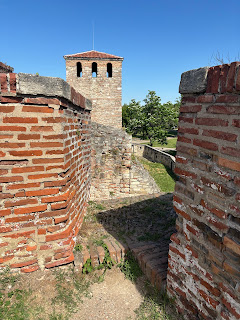Vidin (vih-DEEN) is a small city of about 40,000 people on the River Danube near the corner where Bulgaria, Serbia, and Romania meet. Romania is just across the river, and Serbia is just down the road a few miles. But the contrast with Serbia is stark.
Bulgaria is a European Union member country now, and clearly more prosperous than the last two places we have been in Serbia. Yes, there are signs of the old communist era, such as the concrete apartment buildings. But even some of these have been painted in bright colors.
The main street is a pedestrian-only mall with a large central square. The 19th century buildings are in good shape and the storefronts are mostly filled with thriving businesses that appear to be mainly targeted to residents rather than to tourists. There were only a couple of souvenir shops, and both were selling higher class stuff than the junk usually found in such places.
Our tour leader took us on a walking tour of the very nice parkway that lines the river. Coffee shops were busy with locals enjoying their Saturday morning. Tomorrow is "Children's Day" in Bulgaria (and other parts of Europe), so there were family activities being set up and lots of kids already in the park.
Along the way, we stopped into the mosque which serves a very small Muslim community. About 15% of Bulgarians are Muslims, but most live farther south, near the Turkish border. The Orthodox church was right across the street from the mosque, but we weren't offered an opportunity to see inside.
We also passed a very beautiful and fairly large synagogue which is in excellent condition. But it is now a museum and community center. We were surprised to learn that Bulgaria exported most of its Jews to Black Sea ports and on to Palestine, rather than allowing the Nazis to send them to camps.
Our destination was the Baba Vida Fortress. With the name meaning "Granny Vida," the place doesn't sound very frightening. But it was named for a Medieval princess who refused to marry and instead used her inheritance to aid and protect the people of this area.
Built in the 11th century at the location of an earlier Roman fort, Baba Vida survived an eight-month long seige by the Byzantines who failed to subdue the Bulgar tribes here. It was expanded in the 14th century and only fell to the Hungarians after a protracted battle.
But the Ottomans came along soon after and made Bulgaria a vassal state. They continued to use this fortress until the end of the 18th century. The castle is in remarkably good shape, but the historical displays are very limited. Insurance carriers would have heart attacks at the dangerous walkways and drop offs that are accidents waiting to happen!
After lunch we were herded to a modern, but small concert hall to hear a concert by members of the Sinfonietta Vidin. Supposedly, this is a full-time professional orchestra. Yet, at the same time, our travel company's foundation has been giving them money for "instruments" and other equipment.
Our fellow travelers gave the group a standing ovation, but we thought they sounded like a decent high school or amateur community orchestra. (It's a clue when all of the violins can't bow in the same direction at the same time.)
There was an hour or so after the concert that we had free time, but whether because it was Saturday afternoon or because of the Children's Day holiday, the whole city center was locked up tight. Only a few bars and coffee shops remained open. So we returned to the boat early.
In the afternoon there was a recognition for people who had gone on 20 or more trips with the company. We received a nice gift for our repeat business. Dinner was particularly good this evening, especially dessert, which had a musical theme.










No comments:
Post a Comment